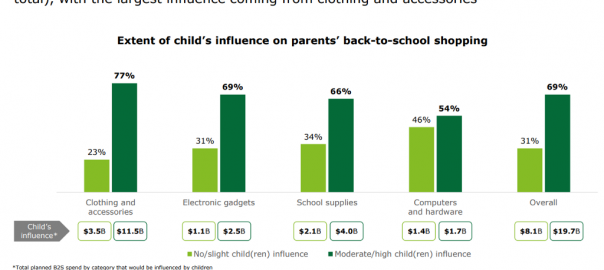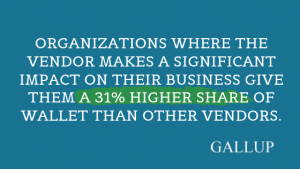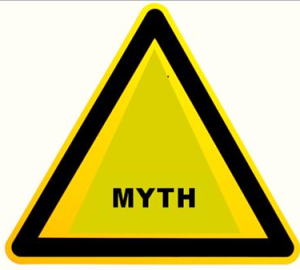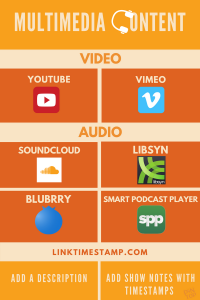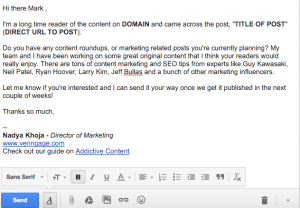— July 25, 2019

It’s nearly the second happiest time of the year! Well, at least according to merchants because back-to-school shopping is the second largest consumer spending season of the year. Despite the rapidly dropping birthrate, it seems all the existing children and teens in America still need new school supplies, clothes, electronics, and vaccinations, making this season a particularly lucrative time for businesses.
Especially this year, because the National Retail Federation estimates that 2019 will see the most amount of spending ever during the back-to-school shopping season. Families with K-12 students will be spending an average of $ 696.70 per household (the highest ever), even though total spending will be slightly down from 2018. Why? Well, our comment about the birthrate wasn’t facetious: the NRF reports “fewer families surveyed have children in grades K-12.” So while there are fewer young students, families are spending more on each of them.
So what are parents spending their money on?
Where back-to-school spend goes
Here’s a great chart from Deloitte’s recent analysis on back-to-school shopping:
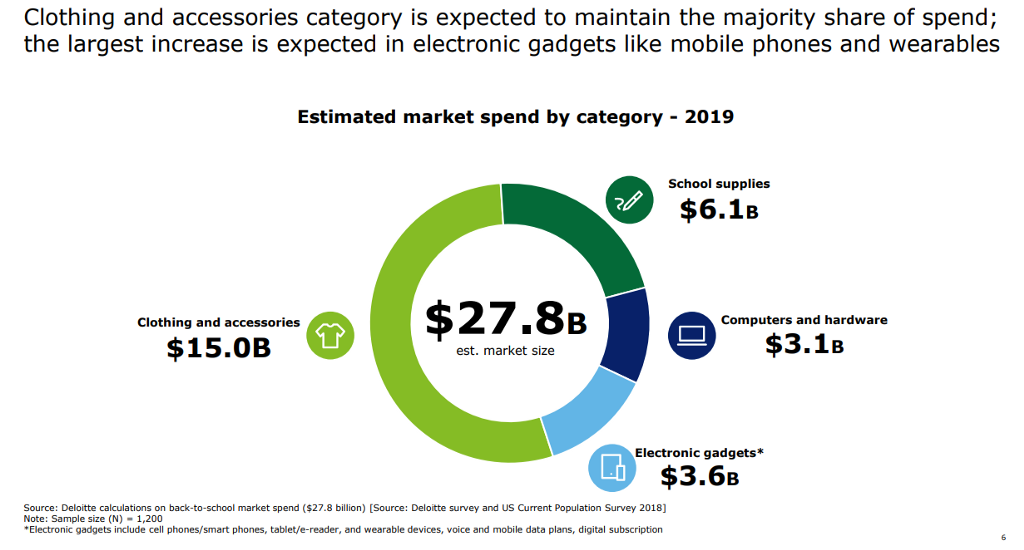
What’s less interesting is the big piece of the pie: clothing and accessories. That segment is always going to be there and always the largest slice (young humans, after all, grow). What’s more interesting is a) the smallest slice being computers and hardware, and b) the fastest-growing slice being “electronic gadgets.”
Gen-Z cares much less about desktops and even laptops, and much more about mobile devices and digital subscription services. When this generation comes online they’re doing it from phones and tablets, and this elevates all the products and services that support that ecosystem.
For example, millions of students will get their very first phone during this time. That purchase creates a need for phone cases, educational apps, Bluetooth keyboards, etc. Knowing where the spend is going to be will clue ancillary merchants who are not quite in the back-to-school space on what products/services will be most likely to move.
When back-to-school shopping starts
Thanks to a fake “holiday,” now all merchants have an easy way to know when the season starts:
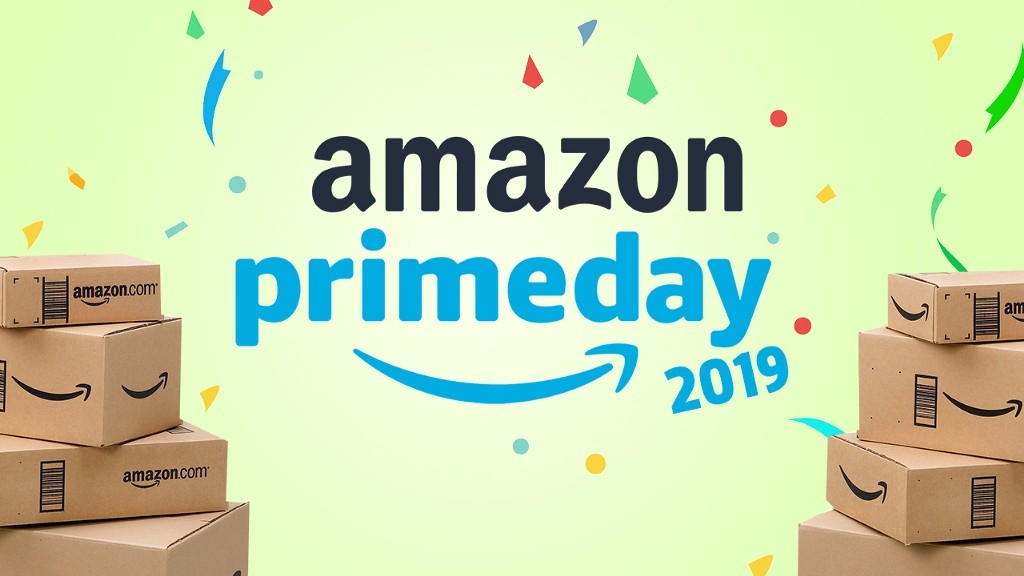
source: gamespot
Not only are parents using Prime Day to start stocking up on school supplies (why do you think Amazon put this day right here in the first place?), according to Deloitte, 62% of all spending is done in the last two weeks of July and the first two weeks in August.
And remember, that’s just the actual spending. This means the research before spending starts even earlier than that. After all, a new iPad is a decently large financial decision for most households, and that’s usually not a spur of the moment purchase at a brick-and-mortar store.
In short, your marketing machine for your business should be ready to roll right from Prime Day into Back-to-School sales.
And here’s another tip for when savvy parents might be most likely to open their wallets: tax-free weekend. Many states have been implementing tax-free weekends during the back-to-school shopping season to motivate households to spend. For example, in Massachusetts it is August 10–11. There are restrictions and limits for each state that participates. Here’s a helpful rundown on what those are.
Affiliate marketing for back-to-school

Now that we know what parents are spending on, and when they are spending, let’s put together the right affiliate marketing game plan to get a piece of that $ 696/household spend.
Activate your affiliate reps that target parents
You should have a good understanding of the demographics and the channels that each of your reps best utilize. If you don’t currently work with the right reps for back-to-school, now is a great time to reach out to some and forge partnerships that can quickly bring in dividends.
The famous “mommy bloggers” are very much in demand for their reach and audience of other parents who look to them for advice and product recommendations. But more parents are turning to video now, so “mommy vloggers” may be more en vogue, and working with these Influencers can help you target the right audience.
Once you’ve identified the reps that can provide the best access to parents, it might be a good idea to give them incentives to sell more during this time.
As well as your affiliate reps that target students
Of course, targeting just the parents is not enough. Do like breakfast cereals do: target the kids. They might not have the direct dollars to spend, but their influence on their parents’ purchasing decisions is huge. In fact, it might be more important to get their eyeballs, according to this chart by Deloitte:
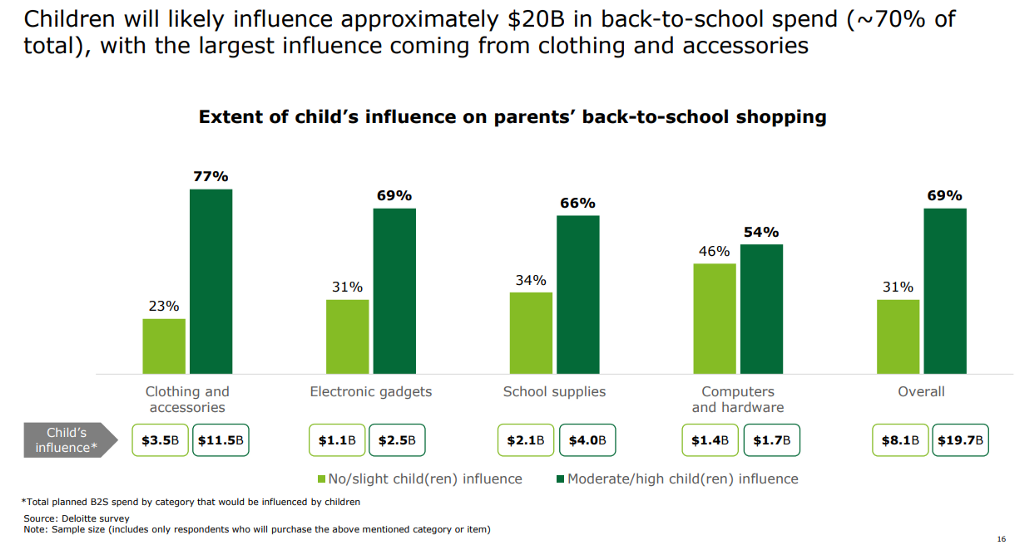
With children affecting about 70% of purchasing decisions, they’re the true Influencers during back-to-school shopping. Again, use your affiliate data to see which of your reps can best connect you with this demographic. Instagram still captures most of the attention of younger humans, so make sure your Instagram Influencer game is on point.
Since so much spending goes into electronic devices, Influencers that review tech products would be great to double down on during back-to-school shopping. YouTube is a clear winner here, but don’t forget about Twitch streamers in this space as well who get plenty of student views. According to influencermarketinghub.com, Twitch viewers spend 95 minutes per day on the streaming site. That’s much longer than YouTube (about 40 minutes).
Create the right content
Understanding what sort of content both parents and students are looking for during their shopping research will help you be top-of-mind. Top 10 lists (that, of course, include your product) of “back-to-school necessities” have a good chance of being shared and clicked on. Getting this type of content to your reps to propagate is important for effective affiliate marketing.
Likewise, your social media posts should showcase students using your products, instead of random adults. Get creative. How about a video series of “kid-tested” where Gen-Z students try out your gear? Or maybe you run a back-to-school give away promotion/contest (again, easily shared by your affiliate reps) to juice interest in your store.
And of course, when the students are back in school, that’s when parents get really interested in some relaxation and luxury products. Capitalizing on that joyous feeling of being “empty nested” can be a great way to extend the summer shopping season by targeting rejuvenated adults.
Digital & Social Articles on Business 2 Community
(26)
Report Post